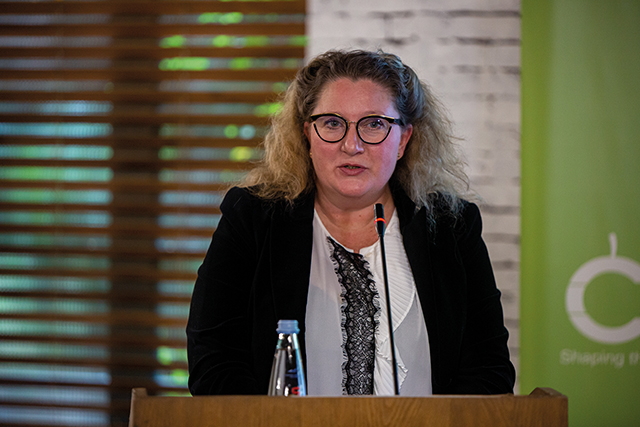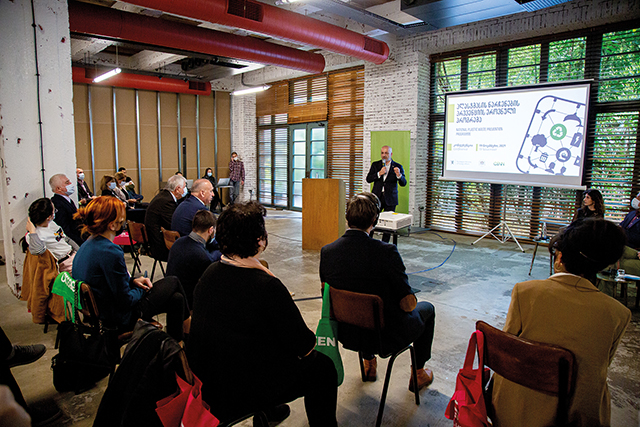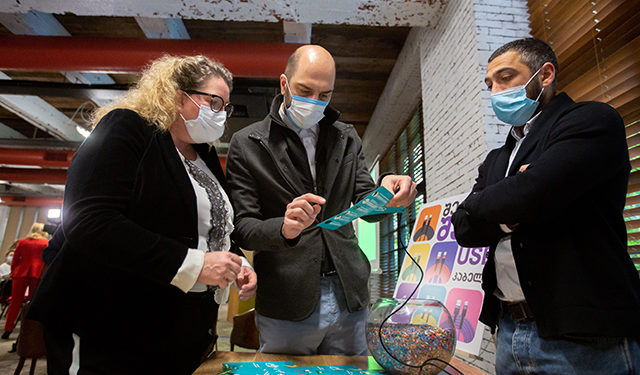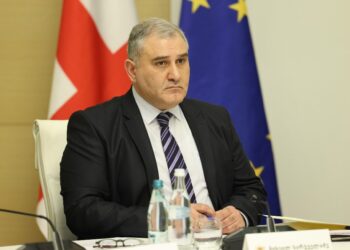The Ministry of Environment and Agriculture, together with CENN, with the support of the Norwegian Ministry of Foreign Affairs, has developed a National Plastic Waste Prevention Program.
On November 19, the document was presented at the national conference and Georgia’s capacity and trajectory to reducing plastic pollution was further discussed among different parties, including producers, recycling companies and economists.
The document sets out a 10-year strategy and 5-year action plan. It looks at the entire value chain of plastic products and offers solutions at each level of the value chain. It also sets out targets of how much single-use plastic should be reduced by 2024 and 2030.
The program is based on the principles of a circular economy, i.e. a resource-effective approach that minimizes the generation of plastic waste and ensures resources are fully recovered along the way.
Issues related to plastic prevention have been high on the agenda of many developed countries, and this problem is being discussed on a number of international platforms.

“All this leads to a global crisis of pollution with plastic waste. According to estimates, the seas and the oceans are particularly vulnerable. If this trend does not change, there will be more plastic in the oceans and seas by 2250,” Nino Shavgulidze, project manager, noted during her speech.
The European Union calls on its partner countries to develop a national plastic waste prevention plan. In response to this challenge, the National Plastic Waste Prevention Program was developed in Georgia by the Ministry of Environmental Protection and Agriculture, with CENN assisting the Ministry in drafting the document with the support of the Norwegian Embassy.
The event was opened with a speech by the Deputy Minister of Environment Protection and Agriculture, Solomon Pavliashvili.
He thanked CENN, the Ambassador of Norway, and the First Deputy Chair of the Environmental Protection and Natural Resources Committee, Khatia Tsilosani. Pavliashvili noted: “We are strong together, and what we achieve, we achieve together. The Government of Georgia, the Parliament of Georgia is trying to take steps that bring us closer to the EU, of course, we take into account specific challenges posed on a national level.
“The document is very complex. I would like to thank the CENN representatives and all the people involved,” he said.
Ambassador of Norway to Georgia, Helene Sand Andresen, delivered a speech and expressed her excitement at supporting and developing this program. She noted plastic waste represents one of the priority waste streams due to the sheer amount that is produced, and causes harm not only to human health but also to the environment.
The presentation was attended by the First Deputy Chair of the Environmental Protection and Natural Resources Committee, Khatia Tsilosani.
“It is a great honor to be with you today and to talk about such important issues related to waste management in the country,” she said. “Especially when it comes to reducing plastic waste. The fact that the business sector is involved in these processes and takes responsibility for the issues related to the reduction of plastic waste once again indicates what good communication there is between the government and business representatives, which contributes greatly to the people who are our partners today, such as CENN,” Tsilosani noted, adding that it is impossible for all this to have an effect on people without regulations being made. “The environment we are to live in should be created by us, and everyone engaged in this process will highly contribute to the development of the country,” she said.

Nana Janashia, Executive director of CENN, also delivered a speech at the conference. She thanked the Ministry of Environment, the Norwegian Embassy, and all the agencies involved in the working group.
“We have been working with the Ministry and the municipality on environmental protection and waste management issues for years. We assist municipalities in developing waste management plans. The waste management plan was developed with our help and we also help the private sector in various ways. It is very important for us to raise awareness, without which achieving progressive reforms will not be possible. I am very happy that with the help of the Norwegian Embassy, together with the Ministry, we have been able to develop a national plastic waste program.”
She noted that an international expert was involved in the process and that the document is in full compliance with international requirements and takes into account international best practices and the context of Georgia.
The document envisages the principle of waste hierarchy, where priority is given to waste prevention, and the vision is that Georgia aspires to become a country focused on waste prevention.
The document was drafted in cooperation with various interested parties employing a participatory approach. Thus, the program was agreed with government agencies, private sector, experts and other organizations involved in the plastic value chain. The Ministry of Environment and Agriculture was the leading agency, the Ministry of Regional Development, the Ministry of Finance, the Ministry of Economy and Sustainable Development, the Parliament Environment and Natural Resources Committee, and Tbilisi City Hall as a service group, and the Government of Adjara in the Adjara Solid Waste Company.
Nino Shavgulidze moderated a panel discussion on international trends and challenges and opportunities in the country in plastic waste management. Participants of the panel discussions were Ludwig Streff, Head of Department – Waste Management International, who spoke about international trends and Germany’s experience in plastic prevention; Levan Pavlenishvili, an economist who spoke about the mechanisms of financial and economic incentives in the circular economy; Giorgi Guliashvili, Chairman of the Waste Management Association, who spoke about the challenges and opportunities for the recycling sector in Georgia; and Corporate Director of Efes Georgia / Natakhtari, Nikoloz Khundzakishvili, who spoke on company policy on plastic prevention.
The conference was concluded with an exposition of plastic recycling companies in Georgia.
By Ketevan Skhirtladze














